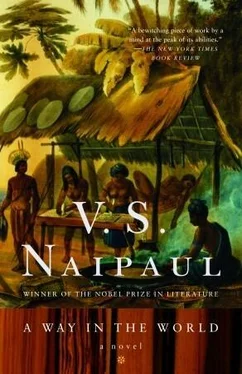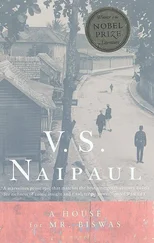The servant and the driver had been found for me by Moses Lubero, who worked as a houseboy for a young English couple some houses away. Lubero was a heavy, slow man with bright, rolling eyes. I sometimes saw him with clothes-pegs in his mouth hanging out baby clothes. Baby clothes! Lubero was more important than that. He was said to control the houseboys on the compound. When he was out and about and he heard or saw my car coming he did a slow swivel of the neck and a very slow roll of his eyes to consider the car and me and the driver. It was as though there was something wrong with the muscles of his neck; but it might just have been his way of letting us know that he was keeping an eye on things.
He wore the standard houseboy whites: a short-sleeved shirt and shorts. From a distance they made him look like a fat boy. As you got nearer, his appearance changed: the fat boy wasn’t a boy at all. He was a middle-aged man who had seen much; there were deep lines from his cheekbones to the corners of his mouth, and frown lines on his forehead. The paunch — creasing the waistband of his white shorts — didn’t suggest softness. It suggested strength, authority, self-regard. Close to, he didn’t look friendly; he had an air of tribal authority. His surname indicated that he came from the centre of the continent; a grandfather or someone further back might have followed an Arab or Indian trader down to the coast and become beached there.
To control the houseboys on the compound was to have power. The jobs were better paid than comparable jobs in the town, and every bungalow or flat had well-maintained “quarters,” a servant room; many people in the town would have liked those quarters. There was also, with expatriates coming and going, a whole system of trade in the cast-off goods. The houseboys were controlled in other ways. It was Lubero who arranged everything when my own servant bought a broken-down old bicycle (borrowing through Lubero to do so, and also buying ill-fitting white-rimmed plastic shades to go with his new bicycle style).
THE COUNTRY was a tyranny. But in those days not many people minded. Africa had just begun to be independent, and the reputation of the president was that of a good man using his authority only to build socialism.
There was a section of the expatriates who saw themselves as serving this cause. It was one of the things that had attracted them to the country. They liked their closeness to power, and their simple but protected lives on the compound; though it worried them that they had to have the houseboys — they talked about that. Some of them even liked the idea of the shortages and austerity outside, and the disciplining of the people. They thought it was what had to come before things became better. They thought it right that people in the villages should be prevented from migrating to the capital. In this way the town didn’t grow, people were protected from the corruptions of town life, and it was easier for villages to be collectivized and returned to the socialism of traditional African ways. I think now that for these expatriates compound life would have provided something of what ashram life or the life of the religious commune provided for others elsewhere: liberation, new rigidities, a new self-awareness and self-cherishing.
Moses Lubero controlled the houseboys, and Richard kept an eye on the expatriates. Richard was English, a slender man in his thirties who used an ivory cigarette-holder. He invited people to dinner in his apartment when he felt they were straying. He worked for the planning department, but he was better known on the compound for the letters he wrote to foreign newspapers and magazines when they published critical things about the country and the president. He wrote not as an official but as a private person. He wrote of socialism as of an austere faith that was its own reward. He might say, “Why shouldn’t a poor African country be allowed to develop its own brand of socialism?” And he might say of the president: “He may not leave his country richer than he found it. But there isn’t only one way of measuring success, and this new man of Africa will have the satisfaction of having ruled according to his own high principles.”
Richard had an easy, self-mocking manner which made you feel that he was half on your side and that you could joke with him about what he had written. You couldn’t. He was humourless; he simply couldn’t take in a point of view that was different from his own.
One afternoon — I had sent the driver away for the day — I took the car out, to practise. I went on the airport road. It was the least busy of the roads around the capital. It went through no villages and it had a nice long straight stretch. On this stretch after some miles I saw a black-uniformed man on a motorcycle coming down towards me. And then I saw another uniformed man on a motorcycle. The men on the motorcycles were gesticulating. They appeared even to be half standing up on their bikes. When they came nearer I saw they were gesticulating at me. It became clear that they were furious with me, and it also became clear that they intended to drive me off the road. I pulled over on to the verge, without accident. Behind the motorcyclists was a big black car, and in the back seat were two men in off-the-shoulder African cloths. One of the men was the president. There was a smaller car behind, and behind that another motorcycle.
A few days later I saw Richard walking in his usual brisk way in the compound.
I said, “The other day the president drove me off the road.”
The fixed, meaningless smile left his face. He became severe. “You are making this up. You know you are making this up. The president doesn’t do that sort of thing.”
“That’s what I thought. But then I had never met him on the road before.”
“You can write what you want, of course. You have that freedom and you know it. The South African exiles here will certainly be grateful to you for your satire.”
He spoke satirically himself. The country offered ready asylum to political exiles from South Africa, and in the compound we had a number of them. They made a distinct, depressive element. A few of them were black; many more were white. The whites were unhappy, damaged people. They might have been damaged by defeat, or it might have been that exile had brought out the melancholy or incompleteness that had always been there in their natures, below their political cause. I had never known revolutionaries before, and I suppose I had theatrical ideas of what they would be like. These people on the compound — whom I saw from a distance, and whom I found hard to get to know — were not defiant or fierce or full of faith. They were more like people who had been dealt a bad hand, had taken a wrong turning, and who would somehow always be out of reach, always dealing with their private demons.
THE COUNTRY was full of a special hate. It was for the small Asian or Indian community who, as elsewhere in East Africa, were mainly traders and shopkeepers and made a closed group.
There would have been ancient connections between the coast and India. It was an East African pilot who showed Vasco da Gama the way to India. The Victorian explorer Speke even published a map, said to be based on old Hindu texts, giving Sanskrit names for the rivers, lakes and mountains of Uganda. There would have been an Indian element in the mixed Swahili culture of the coast But people didn’t carry this kind of history in their heads; and the Asian community that was hated was the more recent one that had come over and settled in the half century or so of British rule.
The hate was in the newspapers, in the parliament, in the compound, in the university. It was open; it was licensed; it brought about no retaliation. Expatriates dealt in it to show their own commitment to the country. Some political people saw it as part of the business of building socialism, and gave it a doctrinal gloss.
Читать дальше












